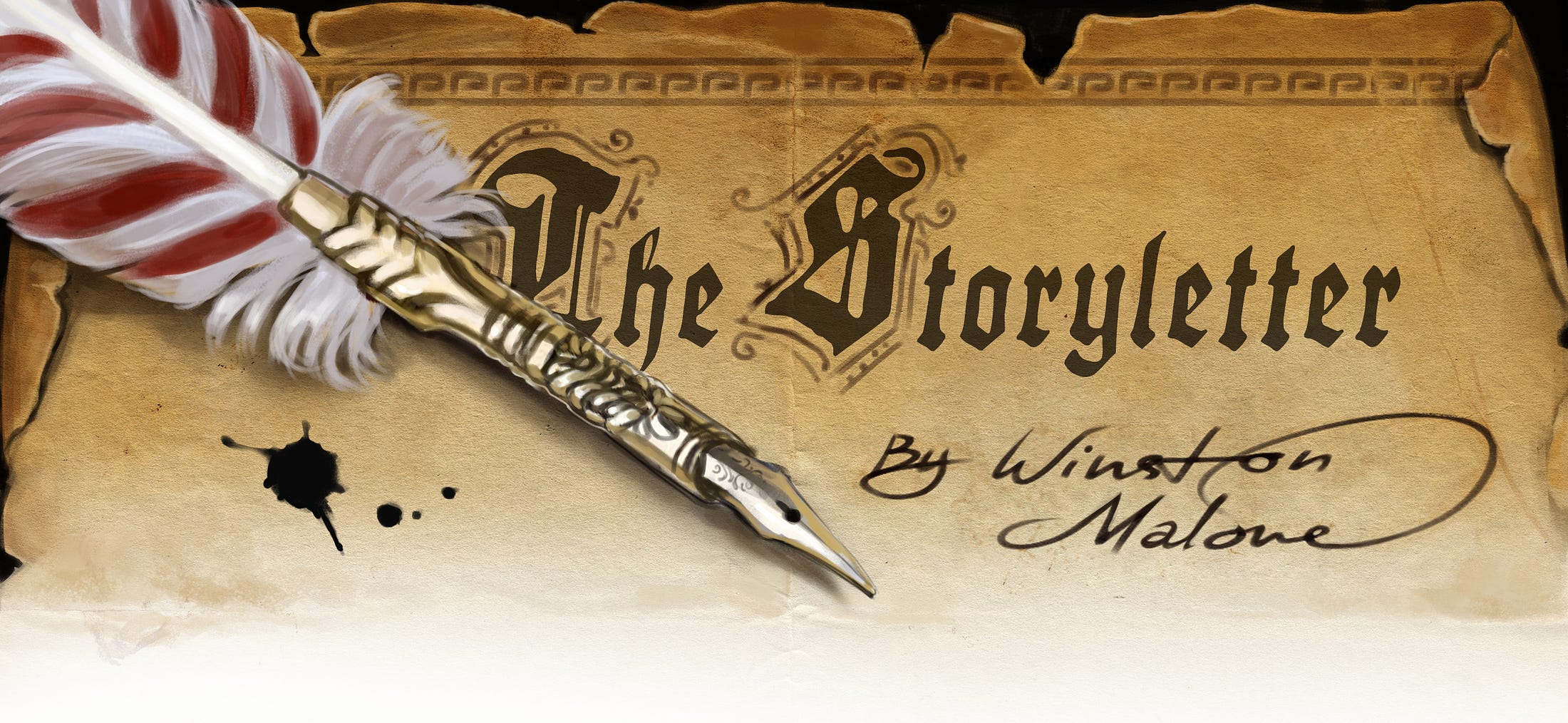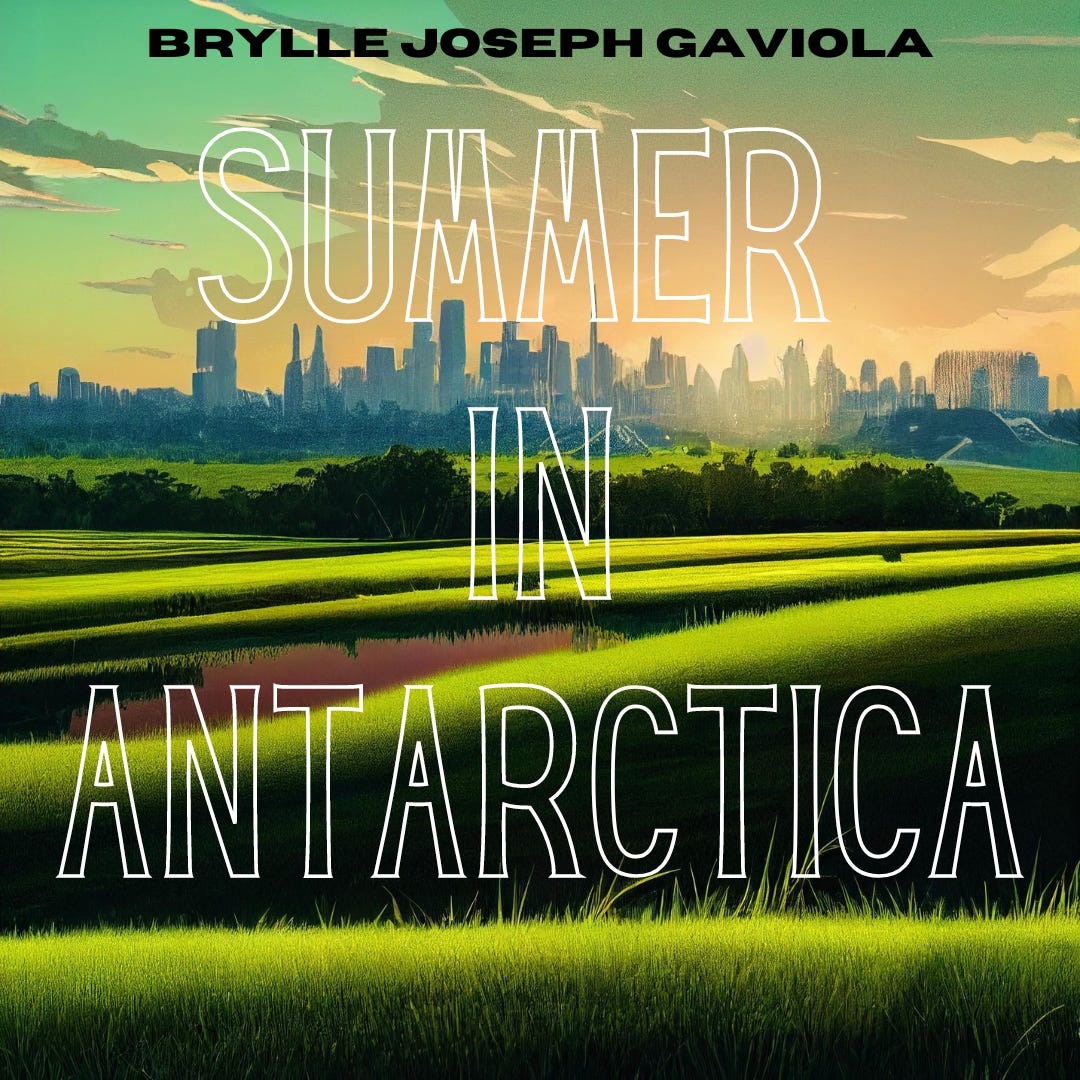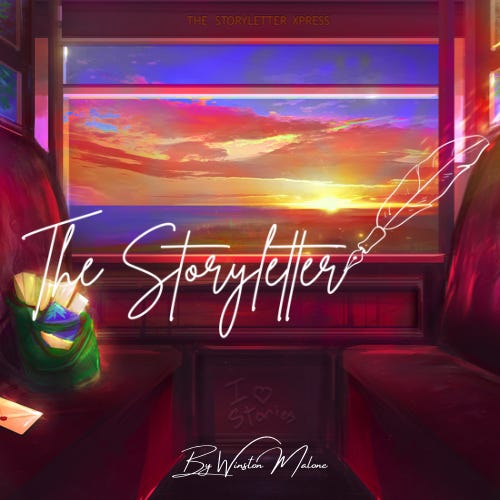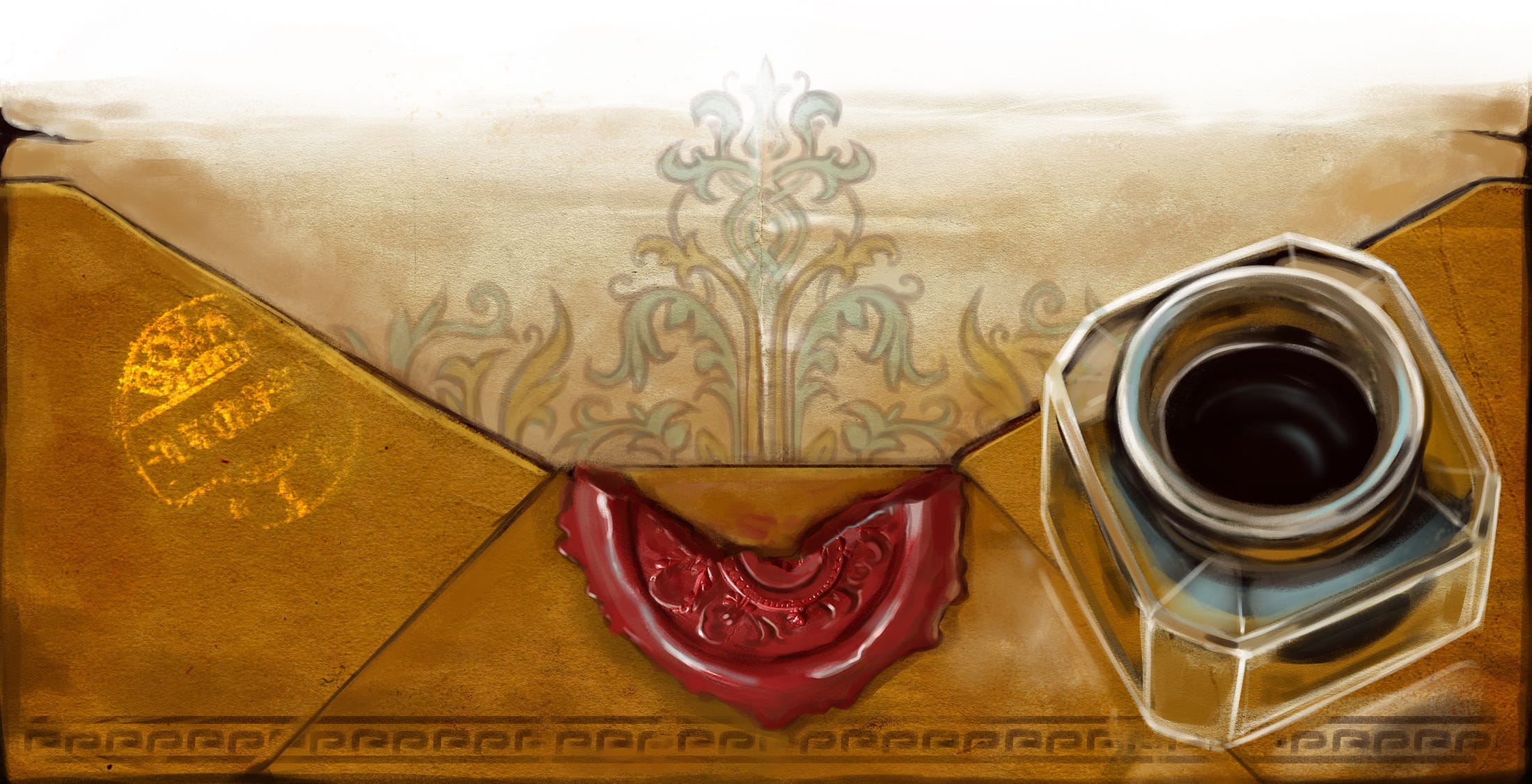The Storyletter - Summer in Antarctica
As the dream fades, I open my eyes to find myself lying on the floor of a dark room, a sliver of sunlight peeking through a blackout curtain. Specks of dust dance in the air illuminated by the beam of light, gracefully fluttering to the floor. I push myself up to stand. My eyes re-adjust. I find a chair next to a table and sit down. Leaning my head back, I hope that it will somehow dull the throbbing pain. Once I come to the conclusion the pain will not be subsiding, I look around the small, dark chamber for any clues to paint a picture of what had happened. Nothing. To my disappointment, my pockets are also empty. I get up from the chair and step up to the blackout curtain to yank it back. When I do, I recognize a familiar place; the sun shining down on green fields of grass extending outward in every direction. There’s a sign in the distance surrounded by flags; suddenly, a nostalgic feeling shoots through my body and I know where I am. This is Antarctica in the year 3022. It’s a week before Christmas, and the six months of 24-hour daylight will come to an end any day now. The extensive amount of sunlight this time of year makes it a perfect retreat for a dwindling human population. The other half of the year, it’s a freezing, dark pit of despair. About a thousand years ago, this continent was covered in ice sheets that scientists would study throughout their career. Due to pollution and a stubbornness to change humanity’s toxic habits, Antarctica is now one of the few pieces of habitable land this planet has left to offer. After people escaped to the space colonies and voyaged to other far-off planets, Earth became a memory filled with ghostly, shambling creatures that have adapted to survive, as all living things must. I take a nice cold shower to get the blood running, but my memory is still hazy. After I freshen up and throw on some clothes, I find a backpack with a phone inside. Unfortunately, the battery is dead. I plug it in and while it charges, I look at my reflection in the mirror and interrogate myself. How long have I been here? What am I doing in this place? Has the sun been up so long that I’ve developed some type of amnesia? When the sun never goes down, you tend to lose track of the days. Eventually, those days turn into weeks and quickly into months, or so it seems. I search through the bag again and I find a wallet with a receipt from Lydia’s Café folded nicely into the billfold. A memory flashes through my head, an image of a woman smiling, her laugh echoing with familiarity. I recall the smell of toasted bread fresh out of the oven, the taste of hot green tea running down my throat, and live acoustic guitar faintly playing in the background. I type “Lydia’s café” into the phone’s GPS and “15 minutes away” appears on the screen’s navigation. The streets of New Vegas are immaculate. No transportation is allowed in the town other than the train that connects to Port Lockroy, the nearest spaceport. We learned long ago from our past mistakes of poisoning the air with exhaust fumes. Humans found a way to reverse the effects of greenhouse gasses by 2065 with sources of renewable energy and hybrid, mechanical trees being a couple of the best solutions. When you have to travel by foot, everything seems much farther and bigger than it is. That’s the gift of walking. Tourists walk around in shops buying souvenirs of the old world. There are many different selections from toys, magnets, clothes, and even unique foods. The food in New Vegas is provided by people living off the land, and very different from what’s concocted in the space stations. Even now, so far in the future, we’re not able to recreate the food that had been available to those who could afford their luxuries. I find it amazing that despite being in a place filled with countless people, you can still feel so alone. Yet, the solidarity New Vegas provides is one of the few things I love about this place; the balance between solitude and social opportunity—combined with the fresh air—is unlike any other planet I’ve been on. As I walk up to the café, I notice the sign is faded and missing a few letters. I can barely make out the words. If it were not for my GPS, I would have walked past this place. Inside, it’s empty. There are no pastries on the counter where they would generally be on display with their fresh-baked smell wafting through the air, nor are there any tables set with utensils. Just a humbling silence. There are, however, photos on the wall of customers and what I presume to be New Vegas locals. Additionally, there are myriad photographs featuring the beautifully-sculpted icebergs, vast landscapes paired underneath the vibrant colors of the aurora borealis in the background, whale sightings and rookeries of penguins, and places all over the town. I’m searching for any familiar faces, but I find none, only moments in time, captured so that we can relive them as much as possible. The photos are an attempt to give the café life, or, at the very least, show that there were signs of life, like ancient cave paintings might have done for past civilizations. I notice an empty space where a picture is missing– The door behind the counter opens and a woman walks out. Her eyes stare at me as if she’s trying to pull me out of a memory. She tilts her head to help fill in the blanks. I raise my hand to say hello, but she instead shakes her head and waves me off. I eventually obey her command and return outside. I glance back to see my blurry reflection in the old café window. The woman’s faint silhouette disappears into the depths of the shop where I can no longer see her. Unsure of how to jog my memory, I walk around in order to immerse myself in the town’s tourist activities. I do everything I can to gain new perspectives so I can recreate my former self. A train pulls into the nearby station, reminding me of a shuttle docking from space. Something from my past is triggered at the sight of the moving vessel. Back on Mars, in the city of Nuwa where I was born, my mother told me something that stuck in my head. She told me that to truly appreciate something you must look at it from a different view. If you want to appreciate the area you live in, hike up a mountain so that you can see how it looks from far away and marvel at how people can build such grand, sprawling things. If you enjoy a swim in a lake, try to fly over it to appreciate its colors and realize how important a body of water is to the surrounding areas. As I recall this information, I walk along a paved walkway until I reach the marker of the South Pole. I had learned that long ago there were only seven nations that claimed the South pole, but now there are hundreds of nations that have planted their flags here. I sit and ponder this at the very bottom of the Earth thinking about how difficult it must have been to get here before the roads were set and the ice reigned supreme. How many people must have died to accomplish something so grand as to voyage all the way out here. Once a perilous task, now a stroll down the street all thanks to those that came before, and yet, somehow, it’s taken for granted. I look back at the town of New Vegas and can’t help but feel thankful I got to experience that last bit of Summer here. The sun will soon set, reminding me that my time is limited. I hurry back to the station and board the Storyletter XPress to Port Lockroy. I understand now that sometimes we get away to get closer to the things we yearn for the most. With that thought, I lean back in my seat to get comfortable and close my eyes. When I open them, I find the familiar face of my wife laughing which prompts me to smile back. She hands me a set of photos that I am reluctant to flip through, but as I do, I see us at different landmarks and sightseeing areas around New Vegas. I discover a picture of myself at the same café I visited earlier. I remember that my grandmother’s name was Lydia, and how hard it was to talk to her because she could not speak English. I feel guilty for not spending enough time with her. I look out of the window of the moving train and I see the sun vanish on the horizon. The train’s brakes engage. I’m not sure why we are stopping, but my reflection stares back at me with grey hair and wrinkled skin. I can’t help but wonder to myself: “Am I dreaming?” Summer in Antarctica is a work of fiction. Names, places, characters, and incidents are the product of the author’s imagination or are used fictitiously. Any resemblance to actual persons, living or dead, events, or locales is entirely coincidental, or made with the utmost respect.2022 Storyletter XPress Publishing LLC Digital Substack Edition.Story by Brylle Joseph Gaviola. All rights reserved.Illustration design by Winston Malone courtesy of Midjourney and Canva Pro.Edited for digital publication by Winston Malone.storyletter.pressYou’re a free subscriber to The Storyletter. For the full experience, become a paying subscriber. Thanks for reading! Until next Storyletter ~ WM |
Older messages
Storyletter Thoughts: All things NANOWRIMO. Are you attempting it this year? Is it worth it?
Thursday, November 3, 2022
I'll be trying my hand at National Novel Writing Month this year, but not in the traditional sense. I'll still work towards 50k words in 30 days…
Project Biotica: A Survey of the Island - Day 2
Monday, October 31, 2022
Raptorverse | Dark Sci-Fi | Photojournalistic Series
The Story Phantom
Sunday, October 30, 2022
Short Story |
Interview with J.M. Elliott
Thursday, October 27, 2022
Writer | Horse trainer | Artist
To Build a Contest
Monday, October 24, 2022
XPress Access | October Edition
You Might Also Like
*This* Is How To Wear Skinny Jeans Like A Fashion Girl In 2025
Wednesday, March 12, 2025
The revival is here. The Zoe Report Daily The Zoe Report 3.11.2025 This Is How To Wear Skinny Jeans Like A Fashion Girl In 2025 (Style) This Is How To Wear Skinny Jeans Like A Fashion Girl In 2025 The
The Best Thing: March 11, 2025
Tuesday, March 11, 2025
The Best Thing is our weekly discussion thread where we share the one thing that we read, listened to, watched, did, or otherwise enjoyed recent… ͏ ͏ ͏ ͏ ͏ ͏ ͏ ͏ ͏ ͏ ͏ ͏ ͏ ͏ ͏ ͏ ͏ ͏ ͏ ͏ ͏ ͏ ͏ ͏ ͏ ͏ ͏ ͏
The Most Groundbreaking Beauty Products Of 2025 Are...
Tuesday, March 11, 2025
Brands are prioritizing innovation more than ever. The Zoe Report Beauty The Zoe Report 3.11.2025 (Beauty) The 2025 TZR Beauty Groundbreakers Awards (Your New Holy Grail Or Two) The 2025 TZR Beauty
Change Up #Legday With One of These Squat Variations
Tuesday, March 11, 2025
View in Browser Men's Health SHOP MVP EXCLUSIVES SUBSCRIBE Change Up #Legday With One of These Squat Variations Change Up #Legday With One of These Squat Variations The lower body staple is one of
Kylie Jenner Wore The Spiciest Plunging Crop Top While Kissing Timothée Chalamet
Tuesday, March 11, 2025
Plus, Amanda Seyfried opens up about her busy year, your daily horoscope, and more. Mar. 11, 2025 Bustle Daily Amanda Seyfried at the Tory Burch Fall RTW 2025 fashion show as part of New York Fashion
Paris Fashion Week Is Getting Interesting Again
Tuesday, March 11, 2025
Today in style, self, culture, and power. The Cut March 11, 2025 PARIS FASHION WEEK Fashion Is Getting Interesting Again Designs at Paris Fashion Week once again reflect the times with new aesthetics,
Your dinner table deserves to be lazier
Tuesday, March 11, 2025
NY delis are serving 'Bird Flu Bailout' sandwiches.
Sophie Thatcher Lets In The Light
Tuesday, March 11, 2025
Plus: Chet Hanks reaches new heights on Netflix's 'Running Point.' • Mar. 11, 2025 Up Next Your complete guide to industry-shaping entertainment news, exclusive interviews with A-list
Mastering Circumstance
Tuesday, March 11, 2025
“If a man does not master his circumstances then he is bound to be mastered by them.” ͏ ͏ ͏ ͏ ͏ ͏ ͏ ͏ ͏ ͏ ͏ ͏ ͏ ͏ ͏ ͏ ͏ ͏ ͏ ͏ ͏ ͏ ͏ ͏ ͏ ͏ ͏ ͏ ͏ ͏ ͏ ͏ ͏ ͏ ͏ ͏ ͏ ͏ ͏ ͏ ͏ ͏ ͏ ͏ ͏ ͏ ͏ ͏ ͏ ͏ ͏ ͏ ͏ ͏ ͏ ͏ ͏ ͏
Don't Fall for This Parking Fee Scam Text 🚨
Tuesday, March 11, 2025
How I Use the 'One in, One Out' Method for My Finances. You're not facing any fines. Not displaying correctly? View this newsletter online. TODAY'S FEATURED STORY Don't Fall for the



